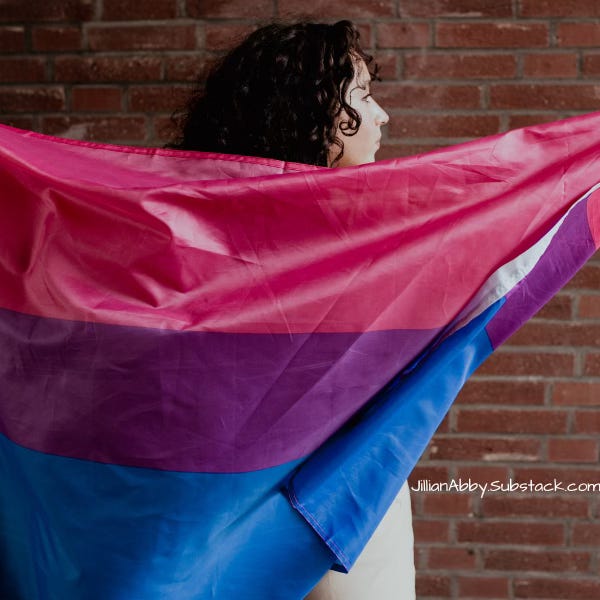When to tell our stories
Even if you decide not to share it with the world, it's still worth it
Dear Queer Abby,
I've come out as bi a few years ago and have a strong desire to tell my story to help people understand more about the bisexual identity and concepts like bi-erasure. I am not sure where to start in writing my story, though, and if it's even worth it to go through the effort. I know some of my family members would prefer I keep quiet. What should I do and how do I do it?
Storytelling in Spokane
Dear friend,
Hey writers– we got a new recruit over here! Load up the confetti cannons and can somebody make a casserole?
Okay, while they’re busy party-prepping let me start by saying that the fact that you’re even considering sharing your story is a powerful step toward creating understanding, connection, and change. You’re here because you want to help others see and value the richness of bisexuality, to shine a light on issues like bi-erasure, and to share your authentic self. That is something worth celebrating!
Now, let’s get into it—the why, the how, and the "is it worth it?" of telling your story.
Why Your Story Matters
Stories are powerful bridges that connect us, even across divides that might seem impossible to cross. Or maybe they’re more like windows, allowing us to see in to a world that is different from our own. Or maybe they’re more like a lifesaver, providing a buoy of support to those who feel like they’re drowning. Regardless of what simile you like, there’s someone out there who feels unseen, misunderstood, or erased entirely, and your words could be the flashlight that helps them find their way.
For bisexual individuals, in particular, there’s a unique set of challenges—bi-erasure, biphobia, and the pressure to “pick a side.” Sharing your story can help dismantle those misconceptions and stereotypes. It tells the world, “Hey, we’re here, we’re valid, and we’re pretty f*cking awesome!”
As for whether it’s worth it? Let me flip that question on its head. What if the better question is: Can you afford not to tell your story? Your story might challenge someone’s limited perspective. It might inspire a young bi person who’s struggling to find their footing. It might give you the kind of catharsis and clarity that only storytelling can. And yes, it might ruffle a few feathers among your family members. But here’s the thing: Telling your story isn’t about making everyone happy. It’s about creating connection and helping your heart (and the hearts of others) feel seen.
How to Start Writing Your Story
Let’s tackle the mechanics of storytelling because sometimes the hardest part is knowing where to begin. Here are some steps to help you find your voice and bring your story to life:
1. Know your why
Why do you want to tell your story? Is it to educate others about bisexuality? To highlight the harms of bi-erasure? To heal from your own experiences? Write down your reasons—this will anchor you when doubts creep in.
2. Break it into small bites
You don’t have to write a memoir overnight. (And if you do, you’re probably a cyborg or you stole everything from ChatGPT.) When I wrote my memoir, it came to me one memory at a time and I wrote it completely out of order. Now, maybe that works for you too or maybe you need an outline first. Either way, start small. Break the process into pieces and create milestones along the way to keep you on track. And if you need some accountability, join a writer’s group or come to my free, twice-weekly co-writing sessions on TikTok.
3. Embrace the messy middle
Writing doesn’t have to be polished and perfect from the start. Your first draft is for you, not the world. Allow yourself to ramble, cry, laugh, and spill it all out. Editing comes later. And then more editing… and more editing.
4. Think big and small
The best stories are both deeply personal and relatable. Share your unique experiences, but also connect them to broader themes like love, identity, or belonging. Think about the questions you want your audience to ponder: What does it mean to live authentically? How do we navigate the spaces between labels? What does it feel like to be bi and how does it impact the way you walk through life?
5. Allow fear to be a part of the process
It’s absolutely natural to worry about judgment or backlash–particularly with something as personal and vulnerable as your story. Acknowledge those fears, but don’t let them run the show. Your story doesn’t need to please everyone; it just needs to be true to you. If you’re not ready to attach your name to your story yet, consider starting with an anonymous blog or sharing your work with a small online community.
6. Find your audience
Not everyone will appreciate your story, and that’s okay. If they did, then that would be the first thing in the history of humankind that we all agreed on. (Not likely to happen). Instead, focus on the people who will appreciate your words and even NEED to hear your story. You’d be surprised who you can help beyond just your B or LGBTQ+ audience.
Hot takes from someone who’s been there
Make it funny: Humor can be a powerful tool to initiate conversations, especially when people are reluctant to listen. Sharing an adorably awkward or wtf funny moment can make your story more relatable.
Feelings > facts: Don’t just say, “I felt erased.” Describe the moment. Was it someone saying, “Oh, you’re just going through a phase”? Was it the look on someone’s face when you mentioned dating someone of a different gender? How did it feel in your body? What emotions can you recall? Bring your readers in to your experience.
Be prepared for an emotional soup: I love writing. Like LOVE it. But sometimes, especially when recounting difficult aspects of our lives, writing can be incredibly emotionally taxing. It can be scary, vulnerable, anger-inducing, or even make you question your sanity. Brace yourself and pace yourself. Make space for self-care. Take breaks. Lean on supportive friends, a life coach, or a therapist if needed. Oh, and stay hydrated.
When your family won’t give you 5 stars
Ah, the family factor. It’s tough when those closest to us don’t understand or accept us. If you’re worried about backlash, keep a few things in mind. You don’t owe anyone access to your story unless you choose to share it. You can decide who sees your writing and when. Lean into the people who lift you up. Share your story with those who celebrate you, not those who diminish you. At the end of the day, you’re the one living your truth. Your family’s discomfort doesn’t outweigh your need and right to be authentic.
Also, check out my previous Substack on the joy of chosen family:
Why It’s Worth It
Let me leave you with this: Your story is a gift. It’s not just a collection of words; it’s a lifeline, a call to action, and a celebration of who you are. By sharing it, you’re planting seeds of understanding and acceptance that will grow in ways you can’t yet imagine.
And on the days when doubt creeps in, remember this: Someone out there is waiting for your story. They need your courage to fuel their own. They need your voice to help them feel less alone. Your pen is your sword, right now in a time where the world needs voices like yours more than ever. Be brave, speak what’s on your heart, and watch the healing unfold.
With so much love,










#3 cannot be emphasized enough. If I cling to one rule of writing, it's the idea of being willing to write a truly terrible first draft. Writing is a form of art in which the "performance" aspect of the process is known only to the writer, but I've found that the act of simply getting my ideas on a page for the first time is the most exhilarating part of the process, and I've discovered many emotional truths during those moments when I'm not merely typing, but riffing on my existing ideas, discovering a narrative voice by performing them at my keyboard.